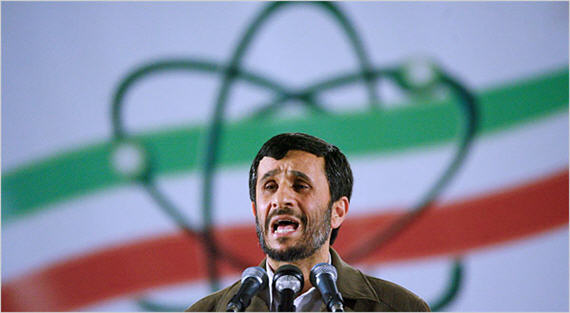A Flawed Legal Argument
Peter Berkowitz has presented a flawed legal argument for attacking Iran.
After a lengthy exposition of the history of preemptive war, culminating with the extension of the definition of “imminent” to include preventive war by George W. Bush and the apparent acceptance of that extension by the Obama Administration in September 2011, Peter Berkowitz finally gets to the meat of his defense of the legality of an attack on Iran:
Because even a single nuclear weapon can inflict horrific damage and deal a small state like Israel a crippling blow, because of the variety of quick and covert ways Iran and its terrorist proxies have for delivering such a weapon, and because their brand of radical Islam undercuts the assumptions on which our cold war models of deterrence rest, Israel’s right of self-defense extends to preventing Iran from acquiring nuclear weapons.
Under international law, the right of self-defense encompasses a right to assist others to defend themselves. Israel’s vulnerability to surprise and devastating attack by a nuclear-armed Iran and its terrorist partners permits the United States, whose capacities to search out and destroy Iran’s nuclear facilities considerably exceed those of Israel, to also lawfully use force to prevent Iran from acquiring nuclear weapons.
I think that’s a flawed legal argument. The relevant section of the UN Charter is:
Article 51: Nothing in the present Charter shall impair the inherent right of collective or individual self-defence if an armed attack occurs against a member of the United Nations, until the Security Council has taken the measures necessary to maintain international peace and security. Measures taken by members in exercise of this right of self-defence shall be immediately reported to the Security Council and shall not in any way affect the authority and responsibility of the Security Council under the present Charter to take at any time such action as it deems necessary in order to maintain or restore international peace and security.
Mr. Berkowitz refers to Daniel Webster’s definition of “imminent”, articulated during the Caroline incident for more about which see here:
instant, overwhelming, and leaving no choice of means, and no moment for deliberation
There are several points that need to be made. First, when the Caroline incident took place there was no relevant international body of law governing preemptive force. There is now in the form of the United Nations charter, the United States remains a signatory to that charter, and the United States is a permanent member of the Security Council.
Second, Iran’s nuclear weapons development program, whatever it may be, manifestly does not meet Daniel Webster’s standard quoted above. That both Israel and the United States are deliberating the issue is prima facie evidence that it does not meet the Daniel Webster standard. An attack would also fail to meet the Noah Webster standard for defense. There remains ample time for the UNSC to take “the measures necessary to maintain international peace and security” and we have obligated ourselves to that standard.
Third, the extension of the definition of “imminent attack” to include preventive attacks made in the absence of solid evidence that what is feared actually exists is an extension too far. If that is the standard for legal self defense, it suggests that fear alone is a sufficient justification. In that case we’d best get ready. The U. S. has the most powerful military in the world by any reasonable assessment, there are a lot of people who fear us, and if Mr. Berkowitz’s argument is correct they’d be legally justified in attacking us.
In his address to the AIPAC meeting over the weekend, President Obama made the clearest statement to date of his unwillingness to allow Iran to develop a nuclear weapon. He added to the “no option is off the table” diction he has been using since he began his presidency the words “military force”. I find no reason not to take him at his word and I also see no way that Iran can assuage the fears that we and Israel have of its developing nuclear weapons. Legalities aside, it appears that we will go to war with Iran.







“Imminent” is such a flexible term as to render it useless as a guide to how how states should conduct themselves. Who decides if an attack is imminent? The launchers of pre-emptive wars? It could easily be construed to justify everything from Pearl Harbor and the German attack on Poland to Frederick II seizure of Silesia in 1740.
I don’t think we’ll have war. I think the line is between potential and actual. My guess is that Iran satisfies itself that it has the capacity, then brings in inspectors and makes nice.
I find myself is this odd place… watching the President pursue out a more hawkish strategy than I think is right and be called a wimpy appeaser who hates Israel for his trouble.
As is the case on many other issues of the day, I find myself defending policy I don’t even like much, because the attacks on it are insane.
Any article regarding Mr. Berkowitz…or any of the neo-con Iraq War Cheerleaders…should carry the following disclaimer:
“X supported commiting 4000 of our troops to death and spending over $2T, for no justifiable reason, in a war of our choosing, with the principle result being a strengthened Iran…the country with which X now wishes to start another war. Therefore any opinion rendered by X should be considered faulty at it’s very core.”
If Israel attacks Iraq, Congress will declare war on Iran. Netanyahu would like us to do it since he would much rather lose American lives than Israelis. Obama has been pretty consistent in his preference for sanctions. Netanyahu is trying to get Obama to go to the military option sooner. With the upcoming election, I dont know if Obama accedes. I hope not. I can see Netanyahu attempting to influence our election with some actions or words of his own. (Perhaps a better historian can remember another foreign leader having this level of influence on our Congress and our foreign policy. Churchill?)
Steve
My view is that an American attack on Iran, directed towards Iran’s breaches of international law, would be legal. (Specifically, breaches of the nuclear weapons prohibitions, and of the related Security Council sanctions resolutions. In other words, I don’t believe any Iranian violation of international human rights laws constitutes a threat to the security of other nations that could justify self-defense) Whether it would be good policy or moral is an entirely different question.
I take this view in large part because of Iranian history. American interpretation of self-defense measures has traditionally taken into consideration a pattern of aggression. Iran’s pattern of aggression goes back over 30 years and is really not debatable. American policy, over decades has interpreted self-defense as authorizing actions beyond the mere imminent, but based upon practical considerations of the nature of the “continuing threat.”
I know customary U.S. interpretations are not enjoyed internationally, but they are the ones I expect the U.S. to follow. They have not been retracted or minimized by Obama. The international community does not object to these concepts of self-defense when non-American countries use them (Turkey and Columbia for example). And a broad interpretation of self-defense is the basis of current American counter-terrorism policy in places such as Yemen, Pakistan and the targeted assassination of Bin Laden.
Gee, maybe we’d better make sure they actually have a nuclear weapon first? Would that be okay?
When was the last time Iran started a war?
Events inside Iran are somewhat revealing (and somewhat hidden both by the Iranians and by our “liberal media”). Apparently Ahmadinejad’s party was very recently defeated by the Khaminei faction. From Juan Cole’s site I learn that Ahmandinejad controls only 25% of their Parliament; his sister was defeated. And Khaminei has repeatedly denied that Iran wishes to possess nuclear weapons. For a long list of his denials go to Informed Comment.
The wrestling match over Iran is about whether the Israelis can tolerate Iran being a “threshold” state. Many countries could have nukes if they decided to. Think of Japan, South Korea, even Saudi Arabia — all could probably obtain Hiroshima scale warheads and some means of delivering them.
If I were an Israeli it would make me very damned uncomfortable to see Iran reach “threshold” status. One can’t blame them for their concerns. But I’m not Israeli. I’m American. And this is one of the differences.
And, in fact, one of the main reasons Iran is trying to acquire nuclear capability is due to its fear of us.
@ Franklin…
and it’s fear of Israel.
With good reason, after what we did next door.
@ Anjin-San…
And it’s the same clowns who f’ed up next door that are stoking the fires now…
Why are they allowed any credibility at all?
Someone please answer that for me?
@Rob in CT:
There’s the makings of a great conspiracy theory there.
@Franklin: @Hey Norm:
im not so sure ‘fear’ is the best way to frame iran’s motivations. more likely, their aspirations are rooted in a desire to take on a larger role as power broker in the region. challenging israel’s nuclear monopoly is surely one way to go about it, for better or for worse.
A good article by Steve Clemons on the Obama/Goldberg interview…which is critical of Obama.
http://www.thewashingtonnote.com/archives/2012/03/note_to_obama_p/
Key takeaway…
You know, considering there’s been a steady drum beat for the past four years at least of let’s-bomb-Iran-tomorrow-or-at-the-latest-next-Thursday, who can blame Iran if they do want a nuclear weapon? Can you imagine all the soiled diapers there would be in this country if the situation was reversed and they were talking of attacking us for the past four years?
There’s this little tidbit in Chaper I of the U.N. Charter:
All Members shall refrain in their international relations from the threat or use of force against the territorial integrity or political independence of any state, or in any other manner inconsistent with the Purposes of the United Nations.
Every time the President says military force will be used if necessary it’s a violation. If the U.S. and Israel are free to violate the charter I don’t see why Iran isn’t.
It’s amusing how we’re all acting as if the UN Charter actually meant anything. It’s a document of convenience that gets used when convenient. Witness the Libya intervention. In the end, nations act in their self-interests and worry about the legal niceties later.
That said, I’ve got to agree that an attack on Iran would be a manifestly bad idea.
This is completely insane. I cannot believe we’re even discussing attacking Iran after the fiasco of Iraq and Afghanistan.Speaking from personal knowledge gifted to me by people who live in Iran I can tell you the average middle and upper middle class member wants nothing to do with attacking the USA or Israel. The problem is their nutcases are just as powerful as our nutcases and just as religious..
@Doug Mataconis: It should mean something, as we’re a nation which claims to respect laws. But I guess that’s always been one of the myths we americans tell ourselves.